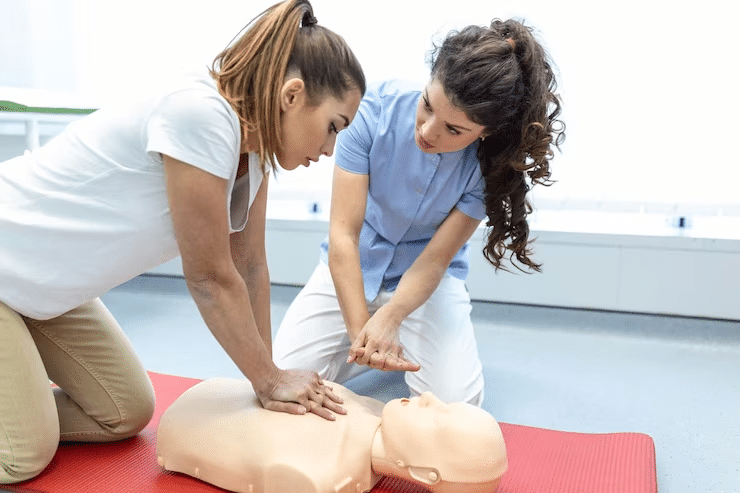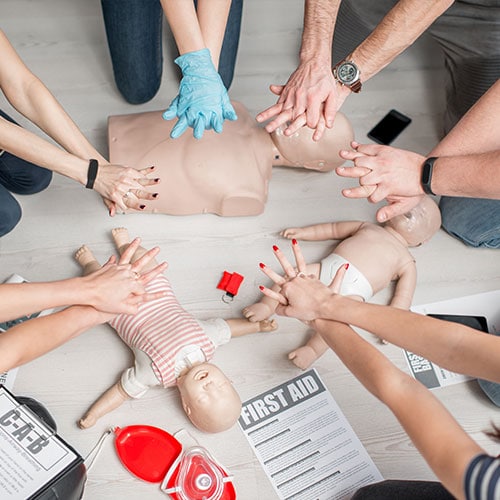Introduction
In today's busy globe, the significance of being planned for emergency situations can not be overstated. Whether you are a parent, educator, or a professional in the healthcare industry, acquiring the abilities to aid in medical emergency situations is important. This is where first help courses entered play, especially those that concentrate on CPR (Cardiopulmonary Resuscitation) techniques. While private training uses its own benefits, team training in first aid and mouth-to-mouth resuscitation courses provides an one-of-a-kind collection of advantages that enhance discovering and retention.
This post explores The Conveniences of Group Training in Emergency Treatment and CPR Courses, highlighting why this technique can be a lot more effective than solo understanding. From hands-on practice to collaborative learning atmospheres, we will certainly look into different facets of group training and exactly how it can improve your experience while acquiring your first help certificate
What Is Team Training in First Aid and CPR?
Group training describes instructional sessions performed with several individuals who discover with each other under the assistance of a certified trainer. In the context of first aid and CPR courses, this layout allows individuals to engage with each various other while grasping necessary lifesaving skills.
How Does Team Educating Work?
In group sessions, individuals usually undergo a mix of academic expertise and practical exercises. The instructor covers essential ideas such as:
- Basics of very first aid Techniques for executing CPR Use of automated external defibrillators (AEDs) Protocols for responding to emergencies
Participants involve with role-playing circumstances, simulations, and hands-on practice. This interactive atmosphere cultivates far better understanding and retention.
Types of Group Educating Available
Group training can take several types:

- Workplace Training: Companies commonly organize first aid programs for their employees. Community Workshops: Regional organizations frequently organize neighborhood classes. Educational Organizations: Colleges might consist of first aid training as part of their curriculum.
Each setting has its unique benefits that satisfy specific needs.
The Benefits of Group Training in First Aid and Mouth-to-mouth Resuscitation Courses
1. Boosted Understanding Opportunities
Group setups naturally promote discussions that boost understanding. Participants can share experiences or ask questions they might think twice to voice in individual sessions.
Why is Peer Communication Important?
Peer interaction encourages varied point of views on managing emergencies. For example, when going over numerous sorts of injuries or clinical crises, various individuals may have run into one-of-a-kind situations that give valuable insights.
2. Practical Method Scenarios
One significant benefit of group training is the chance for realistic technique circumstances. Participants can exercise on each various other making use of manikins or role-play emergency situation situations.
How Does This Improve Skills?
Practicing in real-time assists strengthen techniques like breast compressions or rescue breaths through muscular tissue memory. The even more comfy individuals feel carrying out these activities, the far better prepared they will certainly be throughout an actual emergency.
3. Structure Self-confidence Via Collaboration
When people educate with each other, they cultivate a sense of camaraderie that can build confidence degrees significantly.
What is the Link Between Synergy and Confidence?
Working as component of a team enables learners to support each other psychologically. If someone battles with a specific skill-- like applying plasters-- others can step in to offer aid or encouragement.

Psychological Advantages of Team Training
4. Decreased Anxiousness Levels
Anxiety concerning doing emergency treatment or mouth-to-mouth resuscitation appropriately can prevent performance throughout real-life situations.
How Can Group Settings Minimize This Fear?
In a helpful group environment, individuals are much less most likely to feel isolated with their concerns; shared experiences frequently stabilize feelings of anxiousness. Additionally, exercising along with peers enables them to witness others making errors without judgment.
5. Inspiration Via Shared Goals
Group characteristics often cultivate inspiration from shared goals.
What Drives this Motivation?
When every person aims towards gaining their emergency treatment certificates with each other, people are encouraged to press themselves additionally than they could alone. This collective passion gas commitment amongst peers.
Cost-Effectiveness of Group Training Sessions
6. Budget-friendly Solutions for Organizations
For organizations looking to educate employees in emergency treatment and CPR techniques, team sessions frequently show a lot more affordable than one-on-one instruction.
Why is Mass Rates Beneficial?
Many training carriers offer price cuts for larger groups attending the exact same training course at the same time-- making it economically viable for companies targeting at detailed precaution without damaging the bank.
Social Advantages: Networking Opportunities
7. Producing Connections Among Participants
Training together builds partnerships beyond just discovering lifesaving abilities; it also fosters networking chances amongst community participants or coworkers alike.
How Can These Links Be Valuable?
Networking within a team creates avenues for collaboration later on-- whether it's establishing office safety procedures or creating neighborhood emergency situation response teams after completing their first aid courses.
Accessing Different Learning Styles
8. Catering to Various Understanding Preferences
People learn differently; some absorb info finest with visual help while others gain from hands-on methods or acoustic directions from instructors.
Can Team Setups Tailor Knowing Experiences?
In team setups led by experienced trainers equipped with varied mentor methods-- consisting of videos showing CPR techniques-- individuals have numerous sources available at Canberra First Aid Course Near Me once providing specifically towards their chosen styles!

FAQs concerning Group Training in First Aid and Mouth-to-mouth Resuscitation Courses
1. What certifications need to my trainer have?
Your instructor ought to have appropriate certifications from identified organizations such as the American Heart Association (AHA) or Red Cross along with considerable teaching experience!
2. Is there an age demand for participating?
Most programs approve individuals aged 12 years old and over; however, it's suggested always examine beforehand since various organizations might have details restrictions based upon age groups!
3. How much time does it commonly require to finish these courses?
Depending upon the type chosen-- a basic training course could last around 4-- 6 hours while sophisticated ones might prolong up-to two days!
4. Will I obtain an accreditation upon completion?
Absolutely! A lot of trustworthy organizations provide certificates validating conclusion as soon as you've efficiently passed any kind of required analyses evaluated by your trainer!
5. Can I get involved if I have no previous experience?
Yes! Lots of people register without any background knowledge because trainers damage down concepts right into workable components catered towards beginners!
6. Exist refresher courses offered after obtaining certified?
Definitely! A lot of organizations prompt people re-certify every 2 years given that guidelines progress consistently guaranteeing you stay updated with existing practices!
Conclusion
The advantages derived from participating in group training for first aid and mouth-to-mouth resuscitation training courses are enormous-- from improved understanding chances via peer communications down to psychological support promoting confidence amongst students alike! Not just does this collective strategy make obtaining crucial lifesaving skills delightful but additionally makes sure all involved leave sensation well-prepared should real-life emergency situations occur down-the-line!
If you're considering whether group-based education and learning fits your requirements best when going after a detailed understanding regarding managing urgent treatment scenarios properly after that look no further-- the evidence talks quantities! So prepare today by registering yourself right into one such program near you; end up being an empowered individual capable enough not just save lives yet also inspire others around you too!